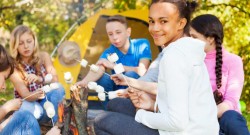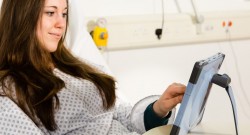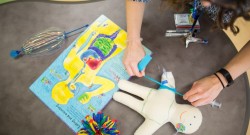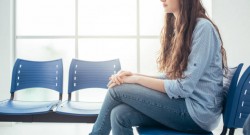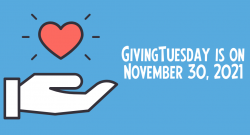Uncategorized
Summer fun while grieving… how do I do this?
Warmer days, longer nights and the excitement of school coming to a close. Summer is right around the corner, and with that comes barbecues, pool parties, celebrations and more. For many, this is what summer is all about, but for those who are navigating a death and are grieving, the idea of a social experience or celebratory event can be daunting. Am I ready? Will people ask me questions? Will I feel overwhelmed? Will my emotions take over?
These are all very normal thoughts and feelings to have while entering unchartered territory. To support you in this transition we thought we would share some helpful tips for participating in social spaces.
- No need to go from zero to hero this summer. Setting expectations for yourself that feel safe and supportive can help in the transition. Perhaps your goal is simply to stop by the event for thirty minutes. Maybe you create a check-in with a caregiver at a determined time to evaluate your coping.
- If you’re worried that people will ask about your grief, or the person who has died, come up with a one-liner or script that you’re comfortable sharing. This will take the pressure off in the moment and ease your anxiety.
- Know that it’s OK to take breaks; do some deep breathing in a washroom, go for a walk, or simply step outside for a breath of fresh air. Taking care of yourself is important.
- Identify a safe person you can speak with or call if you get overwhelmed and want to talk, or even leave.
Being surrounded by others having fun and being joyful can feel like a sharp contrast to what you’re feeling inside, and may trigger strong and maybe even unexpected emotions. It may feel lonely or isolating to be grieving while surrounded by celebration. Know that you are not alone and that there are people who can relate.
Upopolis is here to support you and is a safe space to connect with others and feel heard and understood. Let us know about your experiences this summer on Upopolis! To join, e-mail support@upopolis.com.
Positivity vs. flexibility: why one over the other?
It’s hard to avoid the “be positive” culture we see all over social media. It seems as though the key to happiness is to be positive 24/7. But for our children and youth (and ourselves!), trying to focus on happiness and positivity all the time can actually prevent us from being happy. A fitting name for this phenomenon… toxic positivity. Because it can be just that, toxic.
What is toxic positivity? It’s defined as a dysfunctional approach to managing our emotions that happens when people do not fully acknowledge other emotions such as sadness or anger, and instead preach the idea that everyone should be happy, positive and joyful.
As child life specialists, we absolutely believe in the power of positivity; on a daily basis, we work with children and youth to reframe negative experiences into positive experiences to help reduce stress and anxiety. However, before the reframing begins, we always take some time to acknowledge whatever a child or youth may be feeling, even if it’s “negative”.
We use that word negative lightly, though – emotions such as sadness, anger or frustration really aren’t negative at all since we know acknowledging our feelings helps with emotional regulation, feeling more in control, and making better decisions. That’s why we really do need them. A spectrum of emotions helps teach us, even if it makes us feel uncomfortable at the time. That’s why instead of preaching “be positive!” we should encourage the mindset of “be flexible!”. Studies show that people who practiced a more flexible mindset found better ways to deal with negative moods and experienced less depression.
So next time your or your children are experiencing negative emotions, think about them. Why are you feeling this way? What can you do next time to feel better? What are you learning from this? Once you start looking at these moments of discomfort as learning opportunities and really thinking about how it affects you, you will learn you can handle anything.
Our youth members weigh in: 4 reasons why Upopolis is the place to be!
Upopolis is a safe, secure, social platform for youth living with medical needs and other stressful life challenges to connect with other youth in similar situations. Research says that youth who are able to meet others and share similar experiences have less feelings of guilt, loneliness, stress and anxiety; they are able to share their feelings and have them validated, helping to provide them with a sense of normalcy and feelings of empowerment. While we think Upopolis is a great platform for youth to connect and help each other safely navigate life’s stressful events, we wanted the youth members themselves weigh in.
We asked our Upopolis members why they love the platform, and why they think other youth should join our Upopolis family! Here’s what they had to say:
- Access to Information: “Upopolis has amazing resources.” Through our experienced child life specialists, Upopolis offers a place where children can safely ask questions and access accurate and age-appropriate medical information through our medical library. Through this information, youth are able to be prepared for and understand their medical journey at their own pace.
- A Safe Space for Expression: “I love Upopolis because, here, there are others who understand what you are going through.” Upopolis offers youth a safe space to express themselves. Upopolis youth are able to express their thoughts and feelings through blogging, posts, photos, the creation of ‘spaces’ and more with the support and supervision of mentors and healthcare professionals who understand their unique struggles and experiences; their feelings are validated and normalized as other youth respond and interact with one another.
- Easy Access: “Through Upopolis I was able to have a safe line of communication when my immune system was compromised.” Upopolis can be accessed from anywhere in the world, 24/7. Youth can continue to access the platform during their hospitalizations so they can continue to feel a sense of connectedness. Child life specialists monitor the space and address posts, concerns, and questions in a timely and safe manner.
- Connecting to Other Youth: “I have met so many friends.” On Upopolis, youth are able to connect with other youth who are going through medical needs, just like themselves! There is a whole community of youth who understand the unique struggles that each other are going through; they are there for support, comfort, advice, and friendship.
Written by Sophia, an Intern at Upopolis who just completed an internship towards becoming a certified child life specialist.
Celebrating Child Life Month with our favourite tips and tricks
We love celebrating, don’t you?
Let’s celebrate March, because it’s Child Life Month! Child life specialists are professionals who are specially trained in children’s development and work to support the positive coping of patients and families during stressful life events they may face such as illness, injury, hospitalization, loss and bereavement.
To celebrate Child Life Month, Upopolis’ child life team wanted to share some of their favourite child life tips and tricks with you – whether you’ve been in the profession for 2 or 22 years, are a parent who has a child or youth with a medical illness, or a parent who simply visits the doctor with their child once a year, we’re sure you’ll find these quick tips helpful!
Krista, National Program Manager: Know your local community resources and supports for patients and families. Inpatient stays are now fairly short and clinic visits are quick; make sure you know about, and share, community resources, programs and virtual options to provide your patients with ongoing support and options that fit their needs.
Melissa, Grief Island Lead: Try to provide children and youth with a sense of control when you can. Medical encounters typically leave them feeling helpless; knocking on their door, introducing yourself and asking permission to enter the room gives them back a sense of control over their environment and supports their control of autonomy. This goes for parents, too!
Nancy, Grief Island Lead: Keep it simple when it comes to rapport building tools. Markers, blank paper and a small bin of figurines are small but mighty tools that can be used to build rapport and introduce therapeutic activities with patients. The figurines may also serve as a transitional object for in-between visits. The child can borrow a special toy and use it as a touchstone to remind them of the skills learned in the therapeutic activity. The child may also exchange figurines at each appointment, building that rapport between yourself and the patient.
Tija, Sibling Island Lead and Social Media Coordinator: When having difficult conversations with youth, such as conversations about death and dying, bring along a small item that can act as a “fidget” toy. It may seem juvenile for a teen, but playdough or a squishy ball helps to keep their hands busy during a difficult conversation; you’d be surprised how quickly they engage with them to fill those awkward silences.
Jes, Program Coordinator: Try and build rapport with the child or youth right from the first meeting with them. Scan the room for anything that can connect you to them; look at their outfit, backpack, comfort item… anything that you can use to make a connection. Finding those connections can help to enable conversation and therapeutic rapport which will help you reach the them in that moment.
Sophia, Intern: Give children and youth the information they are seeking, and be truthful about what is going to happen. Children and youth cope well when they have all the appropriate information presented to them in a developmentally appropriate language. Rather than ‘hiding’ information from them because it feels like too much, word it in a way that is simple enough for them to understand.
Jordan, Program Support: Learning a new skill under stress is incredibly difficult, especially coping skills. Spend time exploring and practice coping skills with children and youth when there is no imminent stressor. Identify and practice a favourite breathing technique, establish a relaxing visualization routine, or even dabble in some meditation. Building mastery and confidence in these areas during times of calm helps children and youth pull upon them with success during times of stress.
Happy Child Life Month to all the wonderful child life specialists out there, from our team to yours! For more information on how our child life team operates on Upopolis, check out our past blog: https://www.upopolis.com/2021/03/the-role-of-child-life-online-what-does-a-child-life-specialist-do-on-upopolis/
Photo credit to Hamilton Health Sciences.
Emma’s Epilepsy Experience
Did you know? March 26 is Epilepsy Awareness Day in Canada – a day to recognize and build awareness for epilepsy, a seizure disorder that affects 1 out of 100 Canadians.
Epilepsy doesn’t discriminate! It also affects youth, like Emma. Emma has been a member of Upopolis for over a year and to help spread awareness about epilepsy, she took over the Upopolis blog! Learn more about epilepsy, her experience from a youth perspective, and tips for how to ween off medication if treatment allows. Check it out below:
“Hello! My name is Emma. I was diagnosed with epilepsy when I was around 5 or 6 years old. Epilepsy is a disorder that causes you to have seizures. A seizure is when lots of cells in the brain send out messages to certain parts of your body at the same time. This can cause muscle spasms, loss of consciousness and abnormal behaviour such as staring for some time, etc. There are a few different types of seizures, so symptoms can vary depending on the type of seizure you have. If you would like to know more about epilepsy and the different types of seizures, visit www.epilepsytoronto.org.
In my case, I have tonic-clonic seizures. “Tonic-Clonic seizures are characterized by a fall and rigidity. It is followed by shallow breathing or temporarily suspended breathing, bluish skin and possible loss of bladder or bowel control. The seizure generally lasts a couple of minutes. There may be some confusion and/or fatigue, followed by a return to full consciousness.” (Epilepsy Toronto) I have had a few seizures over the years until I started taking pills to control them. I am really fortunate to not have severe seizure activity. Some people have multiple seizures every day and medication does not work to control this. I ended up having to switch to a different seizure medication because of some minor side effects that were affecting my emotions. I got angry way easier and my parents said that I wasn’t myself.
I have had multiple seizures at school as well as at home. And, believe it or not, even on Christmas Day. My first seizure was at a sleep-away camp. I always told people that, “I was baking peanut butter cookies and I was waiting for the fork to put the marks in it. Then, you know what happens.” I don’t remember a lot from after the seizure. The only other thing I remember is waking up for a split second in the ambulance. (And the fact that it was around 8 years ago doesn’t help…)
As of now, I haven’t had a seizure in around 4 ½ years! 5 if I can go until November. I had an EEG a few months ago. An EEG is a way to scan brain waves and in my case, look for seizure activity in my brain. The EEG came back abnormal, but because I haven’t had a seizure in a long time, my Neurologist (Brain doctor) said that I could start weaning off my medication! I was also on a low dosage than I should be and nothing was happening so she thought it was safe.
Weaning is when you slowly start taking less and less of your meds until you hopefully aren’t taking any. I started out taking 1 ½ pill twice a day. I took away a ½ every 2 weeks. Now, I am not taking any! Sometimes I still catch myself going to take my pills! I felt really excited when I got the news. I was so happy that I could finally stop taking my medication. After a bit of time, I started feeling scared. I was nervous that it wouldn’t work and I would have to start taking pills again. But, my family talked to me and helped me feel less nervous. They also told my teacher, and we told the class about it, and what to do if I do end up having one. I am so fortunate for my amazing and supportive community!
If you have epilepsy, know that you are not alone! Remember to stay strong. Even if you can’t cure your epilepsy, you will be okay. Remember, 1 in 100 people have epilepsy. That sounds small, but if you do the math, that’s around 80 million people worldwide! So, if you ever need to talk, as one out of 80 million, I am here. For those of you on Upopolis, message me! If you’re not, tell a trusted adult you need some more support and they will help connect you with the right people. We’re in this together!“
If you or someone you know has epilepsy, is aged 10-18, and would like to meet other youth with the same diagnosis, e-mail support@upopolis.com to get signed up to our online social platform for youth with medical illnesses!
Positive distractions help reduce stress: 5 activities for long wait times
Have you and your child ever had to wait a long time at the hospital or doctor’s office? Places like the emergency room, doctor’s office, or a clinic may have you wait before you can see a nurse, physician, or someone that will address your child’s medical needs. The long wait can be due to various reasons – sometimes it’s because they have many patients to see; in places like the emergency room, the need to wait may be caused by a medical emergency that someone is having in another room and in this case, all staff members are needed to help provide support.
Waiting can be tough for any child or youth, especially when they’re trying to cope with medical issues that can be painful, uncomfortable or distressing. Long wait times can cause frustration and increased anxiety and stress, especially if pain is an issue. For this reason, positive distraction is important. It can shift individual focus from negative thoughts and feelings to create a more positive experience overall. By using positive distraction activities during wait times, you can reduce stress, increase your child’s cooperation and offer some fun to help children and youth cope with medical issues, procedures and illness so that their healthcare experience is the best it can be.
If you find yourself having to wait, check out these easy distraction activities to help keep yourself and your child entertained and distracted:
- Talk!
- Waiting rooms present the opportunity to be fully present and engaged with your child. Never underestimate how valuable this time can be to just talk with them. This could be a great opportunity to talk about your child’s medical issue/concern; ask your child how they are feeling, validate their feelings, and clarify misconceptions they may have about their visit; let them know what to expect and offer them a chance to process that information. It’s also an opportunity to connect with your youth; ask them how they are doing, if they have anything on their mind, how school is going, how their friends are doing. You can also share favourite memories or family stories with them.
- Play a game
- Mind games like ispy, would you rather, and two truths and a lie are easy and fun to play and don’t require any materials. A quick search on the internet will offer you some ideas – let your child choose the game!
- Get up and get moving
- Long waits can be difficult to sit through. If you and your child are able, try to get up and gently stretch your muscles or go for a short walk. If you are leaving the waiting room, make sure you let a staff member know.
- Pull out your phone
- In a world where we are surrounded by technology, pulling out your phone could feel like defeat. However, use your phone for a bonding and learning opportunity; listen to an audiobook or podcast together; watch a YouTube video or TedTalk; take a virtual tour of a museum. You could also use this time to call a family member or friend together, or send them funny photos.
- Grab a pen and paper
- Using minimal supplies that are probably in the office can also be used to stay entertained. Grab a pen and paper if they are available to play Pictionary or X and Os. You could also write someone a letter.
Hopefully with these activities in mind, your next waiting room experience can be a little less stressful and a little more manageable. It’s important to continue to model the behaviour you want from your child; stay positive and understanding. The health care team is working as fast as they can, and they appreciate your patience! What an awesome opportunity to connect with your child.
Written by Sophia, an Intern at Upopolis, who is also completing part of her internship in the Emergency Department at McMaster Children’s Hospital.
A Prescription for Self-Love
Self-love is great medicine for our physical, emotional, mental and spiritual health. Before we can practice it to better ourselves, though, we need to understand what it means.
By definition, self-love means “regard for one’s own well-being and happiness”. It is also often referred to as self-compassion; taking care of your own needs, accepting your weaknesses, embracing your strengths, being aware of your emotions, and entirely appreciating yourself. Your own well-being and happiness is the most important which is why, in today’s society, self-love can be seen as selfish and egotistical. Sure it’s true, caring for others is so important, but it definitely shouldn’t come at the cost of your own happiness.
Self-love can be hard to master; it can mean something different for each person because we all take care of ourselves in different ways, feel different emotions, respond to situations individually, and have varying views on what good mental health means to us.
In honour of February (the month of love!) Upopolis is releasing 14 days of self-love resources for youth, parents and professionals. We want to help you learn how to love yourself and to make healthy choices in life so that you can view yourself in the best way possible. Why practice self-love with us? Here are 3 good reasons:
- Self-love helps to reduce stress. When you love yourself, you are able to recognize when you might need to step back and take a break whether that’s in your career, school, home life or relationship. You are able to recognize when you might be so stressed you need to slow down.
- Self-love can help you make healthier choices. When you hold yourself to high standards, you’re more likely to make choices that help you grow in a positive way. This could mean eating better, exercising, and getting a good night’s rest.
- Self-love can increase happiness. When you’re always pointing out your flaws and weaknesses, it’s hard to be happy. When you practice self-love and accept yourself, you’re more likely to have a positive outlook on life.
All the self-love resources curated by Upopolis will be released on our social media accounts everyday starting February 7th. After that, you’ll be able to access a downloadable PDF version of the resources from our Created for U page to challenge yourself to self-love! Come back to this link to access it: https://www.upopolis.com/created-for-u/
Join us as we begin to love ourselves!
“Upopolis has changed my life” – Jenna’s journey
Have you ever heard of GivingTuesday?
It’s a global generosity movement always held the Tuesday after Black Friday and Cyber Monday to encourage communities, organizations and individuals to come together to support their favourite causes.
For this year’s GivingTuesday, we reached out to our youth members to ask them to give us a few reasons as to why someone should choose to support Upopolis during their GivingTuesday act of kindness.
Jenna, a member of Upopolis for over 6 years, said this:
Hi my name is Jenna I’m 17 years old. When I was 11 years old, I was diagnosed with juvenile arthritis. It was really hard at first. I didn’t know a single soul who had JIA let alone another youth who spent so much time at the hospital as I did.
I got weird looks at sleepovers because I had to take so many medications. I had to miss a lot of school due to appointments and countless sick days. Most of my classmates and friends at the time really didn’t understand me and talking to other 6th graders was challenging. I had a tough time comprehending my diagnosis at such a young age it was even harder explaining it to other young people who often times weren’t willing to listen or understand. I felt lost and alone.
My rheumatology team recommended I go to a specific camp so I could meet other youth who had similar struggles to me. This camp was really helpful and I made friendships that’ll last forever. At camp, the counsellors told me about an online platform called Upopolis. They told me it was a site that youth across Canada could connect with other youth whom spend time in hospitals.
I was so overjoyed because after I left camp I had a place I could go to connect with kids with similar challenges to me throughout the year. I made so many friends and was even able to find volunteer opportunities through the Upopolis website. I especially enjoyed that during hospital stays, I had people to talk to who really understood what I was going through and supported me endlessly.
Through my 6 years on Upopolis the platform has grown so much! New friends join all the time and I’m always so excited to meet and talk to new people via Upopolis. I feel safe, and in the early days Upopolis was the only social media app my parents really trusted because they knew it was monitored closely by an awesome team of child life specialists. In the pandemic Upopolis was a staple in my life. I’m grateful for all the lonely days I always had someone to talk to and be with. On Upopolis we all care about each other and it’s a beautiful thing. In my time on Upopolis I’ve recruited many of my local friends who’ve joined and also fallen in love with all the platform has to offer. Upopolis has expanded to offer support to youth who are grieving a loss of a loved one (I have utilized their resources a few times since I lost a lot of close people when I was younger. The Upopolis team has shown compassion and it really helped me through my grief) and they also offer supports to siblings of those who have health problems.
Upopolis has changed my life as well as many other people I know. Being a sick kid is hard and connecting with other sick kids really helps. I’m forever grateful for all my time on the site. If you can this GivingTuesday, please consider donating to Upopolis so they can keep growing and expanding and offering more services to extraordinary youth like me across Canada!
If you’d like to donate to Upopolis, please visit https://secure3.i-doxs.net/kidshealthlinks/OneTime_Add.asp.
Any donation, big or small, is so appreciated. We are eternally grateful for your support in helping us help youth!
Navigating “firsts” after the death of your loved one
Following the death of a person who is significant to you, there may be days that feel especially tough… like first holidays, birthdays, and special events that take place without that person’s physical presence. These days may trigger conflicting emotions or bring up memories of the person who has died that you find difficult. Here are 5 tips to help you navigate these firsts:
- Think about days coming up on the calendar that you expect to be difficult for you. Write them down and rate how you are feeling about each one. Then plan how you would like to approach these dates and make a list outlining what you would like to do for each one. Doing this will help you feel more in control and can lessen feelings of anticipation/anxiety.
- Talk with your family and friends about what you feel you can and can’t do on these days to help manage any expectations.
- If other family members are also grieving, where possible have a family meeting so everyone has a chance to share feelings and preferences before a special date/event.
- If you’re unsure about attending a gathering/event, find out more before going so you can feel prepared and there are no surprises.
- You may wish to continue to feel connected to the person who has died on dates that you would normally spend together. You can do this by continuing special traditions or starting new ones. You may choose to include your loved one in the day in a small personal way or do something they loved to honor them.
Ultimately, it’s okay to allow yourself to feel what you’re feeling and to change things up to meet your needs as “firsts” approach. Planning gives you a chance to think about and carry out what is meaningful to you and those around you as you navigate these new experiences.
